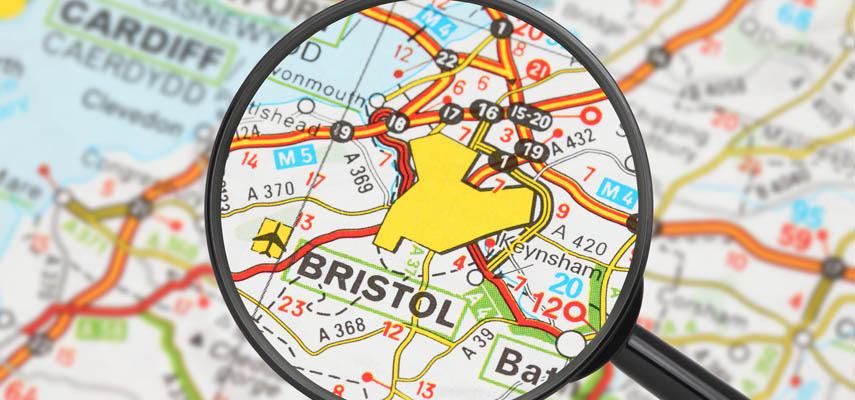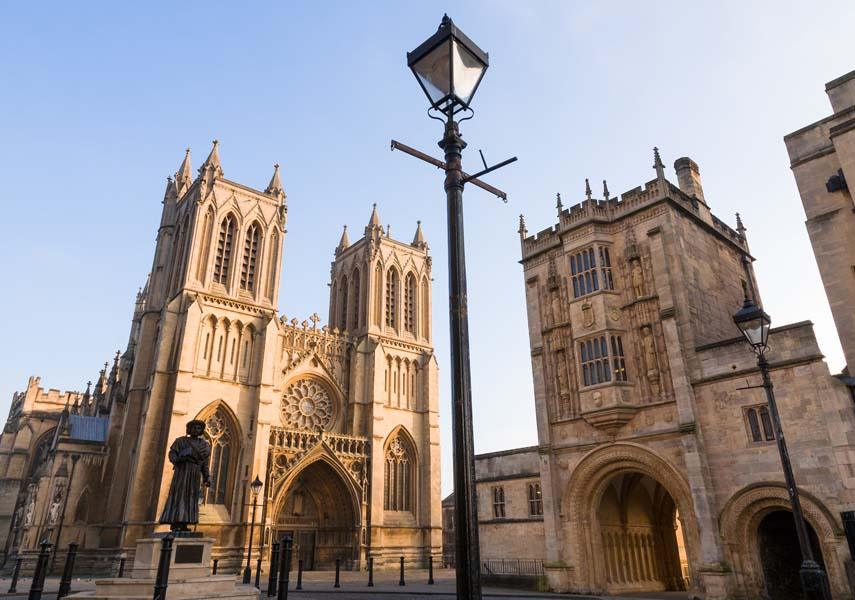Bristol is a city located in the southwest of England. It has an estimated population of close to half a million,
ranking among the most populous cities in the UK. Bristol is one UK's ten core cities.
The name Bristol comes from the welsh Caer Odor, which means "the fort on the chasm." The early settlement in the area
occurred between the rivers Frome and Avon Gorge. The original Saxon name of the city, Bricstow, it considered a Saxon
variant of the original name in welsh.
According to the Office of National Statistics, the city has a population of 442,474 as of 2014. 77.9 % of the population
is white British, and the rest is either black, Asian, or mixed race.
The landscape around Bristol is hilly. The rivers, Avon and Frome, cuts through the rugged landscape forming deep gorges.
The city is one of the warmest in the UK with an average temperature of 10.5 celsius degrees. Rain is evenly distributed during the
year, but it is heavier during the autumn and summer. The temperature never drops below freezing point even during winter.

The city of Bristol is ranked the most sustainable city in Britain. The city has invested in providing services hence increasing
general quality of life of its residents. It is also preparing for climate change by taking the right actions such as recycling
and fostering biodiversity. The Sunday Times ranked the city the best to live and work in Britain and according to statistics from
removal companies in Bristol, more and more people decide to move into Bristol.
And thanks to the wide variety of moving services and
high competitiveness between different moving providers (you can choose between
Bristol man and van or
London removal companies), there is no problem finding a professional removal service.
To make it even more easier, we developed comparison services where you can
compare removal quotes from different firms in different areas.
Inn 2015, it also received
European Green Capital Award, making it the first in the UK to win the award.
With a rich history of cycling, the city became the cycling capital in 2008. Bristol is the headquarters of charity Sustrans,
the organization that created the National Cycle Network, a 16-mile traffic-free network. For new visitors, riding a bike is the
best way to explore the city. Visitors do not have to buy a bike as they can hire one at the Cycle the City. Cycling is one of
the sustainability measures pursued by the city.
For sports lovers, Bristol is the home of sports teams such as Bristol City and Bristol Rovers. There are cricket clubs and rugby.
Bristol has historically relied on trade as the primary business, exporting wool cloth and importing fish and grains and tropical goods.
The city is still a busy port but also relies on other defense, media, information technology, tourism, financial services, and aerospace.
With a GDP of £30.502 billion and a per capita of £46,000 Bristol is one of the richest cities, 65% above the national average.
It has a low unemployment rate, lower than the national average.
This follows the rising costs of living in a big city,
but they are still significantly lower than for example in London.
Bristol is a Fairtrade City and a very successful one, hosting International Fairtrade Conference in 2015. Some of the best food markets for
customers to sample at the city include St Nicholas Market and Harbourside market. The market sells food made from local produce.
In 2012, Bristol introduced its currency known as Bristol Pound. With the money, people use local currency to consume local produce, which
lowers the carbon footprint of food eaten.
This year the Sunday Times proclaimed Bristol to be the best place to live in Britain so there's no better time to make
a relocation to the west country a reality.
With two teams in the football league (the robins and the pirates), and a
rich arts scene the city has something for everyone. In the city which street artist Banksy and Hollywood icon Carey
Grant hail from there's a plethora of things to see and do. Wander the streets to catch now world-famous street art, or
head to the Bristol Museum and Art gallery to view a fine selection of art, natural history and chinese ceramics.
For thespians the Bristol Old Vic, an offshoot of the London theatre of the same name.
Buildings from pretty much every british architectural period can also be found in the city, and it's economy is
built on (amongst other big industry like aerospace) the media sector. This thriving professional scene means
there's currently a buoyant job market - great news for those thinking about moving there. Plenty of folks have
made the jump before, and plenty more will follow into permanent residency within the most sustainable city in the country.
This means there are tried and tested removal options in and around the city to suit every circumstance.
Archaeologists have discovered flint tools dating back to Middle Palaeolithic, indicating that Neanderthals inhabited the area in the years 300,000 and 126,000. Iron Age forts have also been found. The Romans built forts, villas, and settlements around Inns Court. While the area around Bristol has been inhabited for thousands of years, new Bristol started taking shape in 1000. A well-fortified town, the residents, often launched raiding parties to Ireland. The arrival of Normans further increased the importance of the city, becoming one of the strongest in southern England. It gradually gained prominence in the middle ages as a trading port before industrial revolution led to the emergence of Manchester and others as rivals hence diminishing somewhat the importance of Bristol. Bristolians is the name of long-term residents of the city, and they speak English with a distinct accent known as the rhotic accent.
This iron ship was the largest vessel during its day. However, due to its high cost, its owners went bankrupt. After repair following an accident, the ship went on and had successful voyages for many years.
This tower was built in the 19th century to commemorate Cabot and his voyages of discoveries that landed him in what is now Canada.
This cathedral was founded in 1140 and dedicated in 1148. Its original name was St Augustine's Abbey, but it became the seat of the bishop of Bristol after Dissolution of the Monasteries. The nave of the cathedral was built in the 19th century.

Construction started in 1915, and official opening took place in 1925. Its style is Gothic, making it one of the last buildings in the UK to use the style. A German bomb destroyed Hammerbeam roof, and restoration was done in the 60s.
Castle Park was once the main shopping district of the city. However, during the Second World War, German bombs destroyed the shopping area, leaving room for the establishment of the park during the reconstruction of the city after the end of the war.
There are many others such as The Underfall Yard. You need to visit and explore places that are more exotic.
Bristol is one of the friendliest cities to spend time with friends and relatives. It is packed with attractions and activities to keep visitors engaged. So don't worry if you are moving away from friends. There is a lot of places where your can make new relationship. Here are so me of the best places to visit:
This is the leading interactive science center in the UK. Visitors enjoy hands-on exhibits, live science shows, and dozens of other creative activities. For instance, Animate It! which is one of the features in the center, allows children to mess around with animation and create cool things.
M-shed is an innovative way of learning the history of the city through the stories of people who lived there. It is essentially a museum containing information about the city past through the eyes of the inhabitants
This is a guided tour that explores the secrets of pirates of the 17th and 18th centuries who terrorized the city. There is a reconstruction of the type of ship John Cabot used to discover Newfoundland in 1497.
This is a guided tour that explores the secrets of pirates of the 17th and 18th centuries who terrorized the city. There is a reconstruction of the type of ship John Cabot used to discover Newfoundland in 1497.
The tourism economy of Bristol is vast, valued at more than 1.2 billion pounds and employs more than 27,000 people.
A significant fraction of tourists who visit the city come from overseas. On average, foreign visitors take 6.45
nights per trip, spending an average of £58.39. For comparison, domestic visitors average 2.5 nights per trip but
spend higher at £78.20. Overall, oversea visitors spend more money during their visits to the city.
Day visitors spend £37.82 per trip.
In 2015, a survey carried out by International Passenger Survey found that received 526,000 international tourists,
making it the eighth most visited city by foreign visitors in the UK. Germany, France, and Spain are the primary
source of foreign visitors who come to Bristol.
In 2013 to 2015, Bristol received 1.5m domestic staying which makes it the fifth most traveled city in the UK.
During the same period, Bristol and South Gloucestershire received 13.4m day visitors.
The majority of places visitors stay in Bristol have achieved Green Tourism Business Scheme award, which a
sustainable grading program. Radisson Blu, for instance, has reached the Gold Standard.
It is not an exaggeration that Bristol is one of the best cities to live. With so many opportunities for work,
school, and doing business, it is easy to understand why people rank it among the best. Commitment to sustainability
means cleaner and safer city for all. With the millions that visit the city, whether from within the UK or overseas,
the city remains a "must visit" destination. There is much more to see and sample, from the parks to historical building.
For those who love fun and food, there many pubs, food market, and restaurants, to sample.
Bristol is the largest producer of hot air balloon through the company Cameron Balloons in Bedminster. The city is the home of Ribena, created in 1933 by a scientist working at the University of Bristol. Ribena is widely considered an alternative source of vitamin C, which is essential for health. The famous pirate Blackbeard, also known as Edward Teach was a Bristol native. His headquarters was the Redcliffe Caves.
leave comment